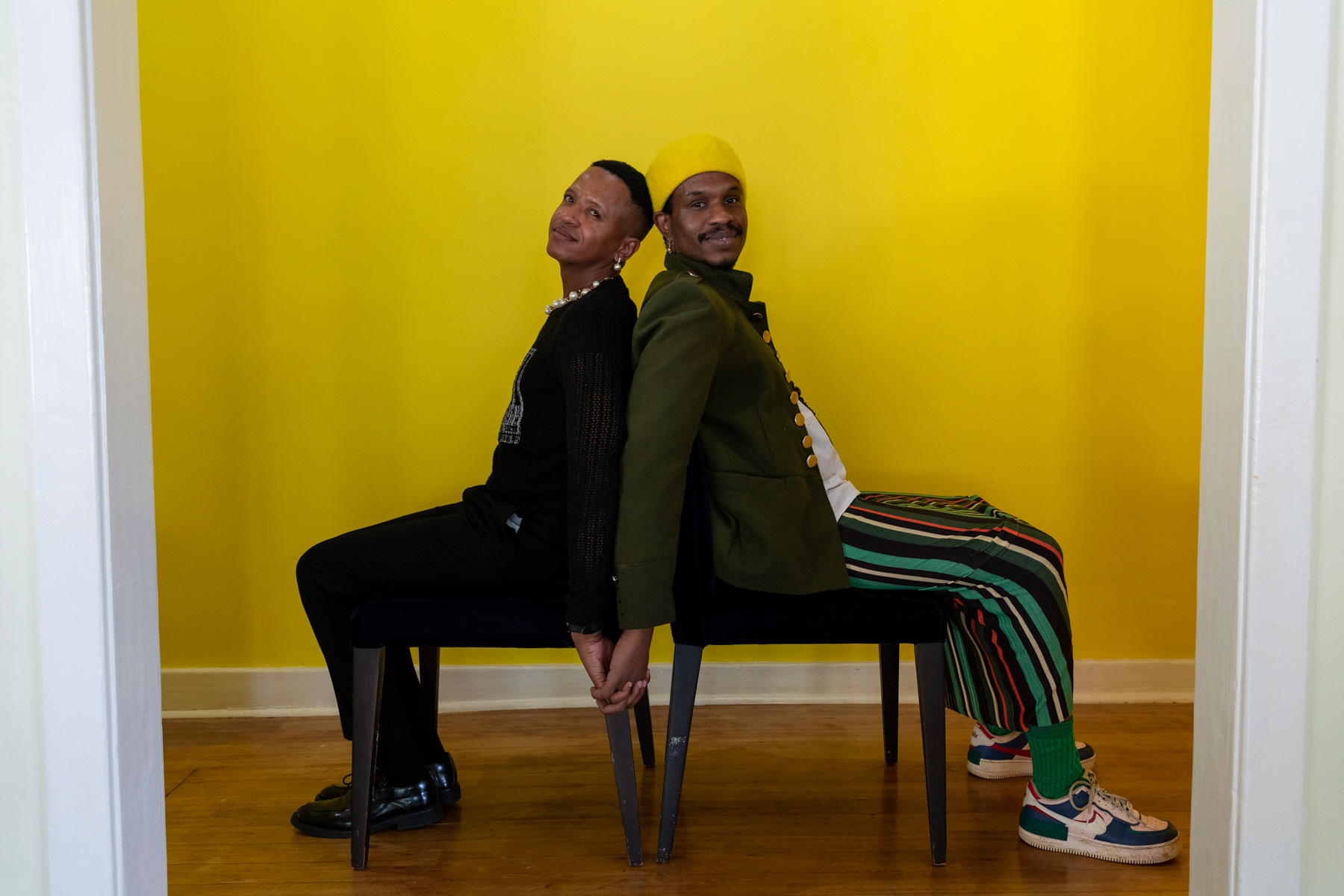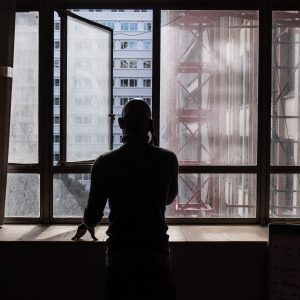Queer folks find a home online
LGBTQIA+ people have created new communities online to fight the isolation of lockdown, holding balls and collecting stories that create a safe space to gather and connect.
Author:
10 June 2020

“Fuck that! If we leave it, then they win,” Kgosi Motšoane said. It was shortly after the start of a recently held online ball and Motšoane, like the other contestants, realised the live event had been hacked.
“There were a lot of visuals of decapitated bodies and misogynistic terms that came up on our screens,” recalls Treyvone Moo, one of the event organisers. “Also words like ‘faggots’ and things like ‘this is a black gay thing’. So,” Moo sighs, “as the opening to the ball, it was extremely … negative. We almost gave up.”
Spurred on by Motšoane’s call, however, the organisers feverishly went about ensuring the event continued. “We quickly set up a new account, reached out to our networks, created a new password, spread everything through the networks and, by the end of it all, we had about 400 people view the ball,” says Moo.
Under the moniker The Post-Apocalyptic Ball, the event was an online iteration of the monthly Johannesburg-based balls. “We had a ball planned for the week before the coronavirus actually hit our shores,” says Moo. “There were so many queer bodies ready to perform, so we felt it would honour them to have a digital version of the ball. Especially during this time when people really want to connect, you know. The early emotive stage of Covid-19 was like, ‘Oh my God, is this really happening?’ Now people really want to connect. So we set this up as a connection tool.”

Documenting the queer experience of lockdown
In Reflections on Lockdown: On Safety, Being Queer and Home, Neil Hassan “ruminat[es] on the inherent sense of security that homes represent”.
Hassan writes: “For many who wear otherness as armour (and those who can’t/won’t), the queered body rarely finds rest when unarmed, even in the asylums of their homes. For them and many others, being under lockdown can be hazardous terrain to navigate. There are limited accounts that celebrate queer bodies and the ways they occupy and embody urban space in Africa and elsewhere in the Global South. Without insight into nuances that construct queer livelihoods, I believe we will fail to holistically understand how the marginalised experience space and place … Without these other perspectives we dangerously risk representing queer bodies as objects and subjects.”
Moo concurs. “Documenting the queer experience during the Covid-19 pandemic is extremely important. Events like these remind us that we are not alone. So it was also really important for us to connect with and create space for African performers.”

Participating in the event were performers from South Africa, Brazil and Nigeria. It was as a result of photographer Sabelo Mlangeni’s recent exhibition, The Royal House of Allure, that Moo came to know of the safe house for LGBTQIA+ people in Lagos, Nigeria. Moo set about contacting the founder of the house, house mother Mr Morrison, in the hopes of getting its occupants to participate in the online ball.
“Everyone in the house was so, so excited,” says Morrison. More than an opportunity to merely show off and have some fun, however, participation in the ball was, for them, important for a different reason. “Apart from the fact that our environment and our society criminalises our sexuality, we felt it was time to tell the world that, in spite of our situation, we still have the power to drive forward. You get? We wanted the whole world to know we exist and that we are here fighting for what truly should be ours, which is our freedom some day. We used that opportunity to express our existence, our struggles and our desire to be free. You get?”
Related article:
The three-bedroom house, which currently houses 17 people, was abuzz with excitement as preparations kicked off. “They could not actually wait for that day,” Morrison says. “What we had to do was go and get things for, like, the backdrops, some decorations. We needed to come up with something that would look, you know, eye-catching. You know, it was just such a time of excitement. We were all really anxiously waiting for the whole world to see us. And it was very, very, you know, satisfying when we discovered that people outside were really saluting our courage and you know, like, ‘Wow, you guys from Nigeria’. It was unbelievable, something like this happening in Lagos. You get? So we were really, really happy.”
Against erasure
“The biggest challenge queer people on this continent face is erasure. And this erasure happens in many different ways,” says Motšoane. “And in this time, we are seeing lots of countries using Covid-19 to stifle queer rights. So I think that creating these online platforms allows us to remember our stories and create space where our stories can be told. And for us to sort of fortify, reinforce and motivate one another to stay present – to feel seen, to not be erased.”
Aside from participating in the occasional ball, Motšoane is also the founder of the monthly series of events Bare Stories, which bills itself as a “platform for the queer community to air censored narratives”.
Motšoane is currently in the process of putting together Alt Q, a zine that will offer queer folk the opportunity to relay their experiences during “the queerantine”. “I think, more often than not, it tends to be queer stories that are conveniently forgotten or erased,” Motšoane says.
Related article:
Keval Harie is the director of the Gay and Lesbian Memory in Action (Gala), the queer archive at the University of Witwatersrand. In a bid to prevent this possible erasure of queer stories, the archive kick-started the Gala Queer Lockdown Project.
“It started pretty much at the same time as the government introduced the national state of disaster and lockdown,” says Harie. “The idea at that point was really to ensure that queer experiences during the lockdown weren’t being drowned out and forgotten. When we put out the call, we kept it quite open and creative because we thought that was an important aspect. People could then share experiences in whatever format they felt comfortable with. And there have been quite a lot of people who have submitted.”
Harie adds that unlike other online initiatives, which offer more immediate results, this collection of first-person accounts will take time to put together. “Because we’re asking people to share personal stories, we have to be very careful around how we share this information. And generally with archival projects, it’s not likely that we will package this in some form immediately. It’s more just about ensuring that we are doing the collating at this time. Another part of the challenge is that for a lot of people the online space is very inaccessible in a way because of data costs and people not necessarily wanting to share something personal online.”
Online space for community
Not letting itself be limited by the more time-consuming nature of this kind of project, the archive has also put together online forums such as the Gala Youth Forum, now conducted via WhatsApp.
“That’s really about considering the fact that, for a lot of queer people, the lockdown means essentially having to go back into the closet as you are kind of forced to now live with your family. So this forum is an important space where youth from Wits [University] and other colleges and universities have access to this space, even if some of them are not necessarily out to their family members. It really is about how do we allow for a support system during this lockdown in ensuring that people still have access to a sense of community? Because the harsh reality is that, for a lot of people, being within your home isn’t necessarily a safe or affirming space. So we need to try and keep those channels of communication open. It’s not always ideal, because things like data costs [money]. But still, we have to just keep those channels open.”

For Harie, the creation of these channels is particularly important given the uncertainty of living through a pandemic. “I think, given the nature of this global pandemic, the humanity can be lost when we are just talking about the health impact and the number of deaths and infections. And so for us it’s about ensuring that we don’t lose our humanity in the broader picture. Because at the end of the day, this virus impacts people – people with stories of hardship, of resilience, of love, of family and what family means to them.
“It’s also about ensuring we are creating a sense of community at a time when there is this great sense of anxiety, of loss, of what we’ve lost and what we will continue to lose. A loss of community and the kind of huge impact this is going to have on all of us for very many years. It’s about asking how do we create a sense of community that holds us all in the space, but also offers us an opportunity for us to really challenge the ways in which we have been operating?”
Feelings of hope
Having successfully put together their first online ball, Moo recalls how “uplifting” the event was. “That ball didn’t have a good start, but it ended up leaving me feeling hopeful. Through it, we found stories of families – a mother filming for a participant in Cape Town, a father filming for another performer. It left me inspired. I mean, if you have mothers and fathers participating in probably the queerest thing there is in South Africa, then it shows that mentalities and views are shifting, which is amazing.”
Related article:
Back in Lagos, the effect of participation in the contest lives on. “We are still carrying on,” Morrison laughs. “Last Saturday, we had our own ball here in the house. In a month, we want to have two. So that’s where we strut it out: who’s going to be the face of Allure? Who is the sexiest? Who is the most talented? It’s like a normal routine now for us to keep up with this. You get?”
For Motšoane, the reason he adamantly refused to let the homophobic hackers hamper the event’s heady happiness is simple: “Look, having these platforms allows us to reinforce our presence. So many people are forced back into the closet at this time, so having these gatherings online gives us an outlet for us to share our stories, to comfort each other, to celebrate our resilience – and really just try and figure out ways to survive all of this.”



